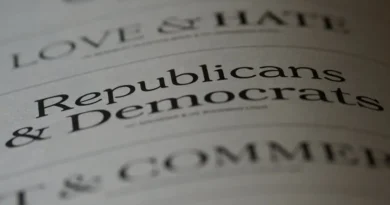Fascism And The Democratic Party
The Democrat Party and Perceptions of Fascism: A Detailed Analysis
Table of Contents
Fascism And The Democratic Party. The term “fascism” is highly charged and historically specific, originally describing the authoritarian, nationalist regimes of Mussolini in Italy and Hitler in Germany. However, in contemporary political discourse, it is often used more broadly and pejoratively to describe various forms of authoritarianism or perceived threats to democratic norms. Many critics, particularly on the right, have accused the Democratic Party in the United States of engaging in actions and rhetoric that can only be described as fascist. This analysis will explore the specific claims made against the Democratic Party, the actions that have led to such perceptions, and the broader context of these accusations.
Government Overreach and Authoritarianism
One of the primary arguments from critics is that the Democratic Party has increasingly favored government overreach and authoritarian measures. This is seen in several policy areas and legislative actions.
- COVID-19 Policies: During the COVID-19 pandemic, Democratic leaders at the federal, state, and local levels implemented stringent public health measures, including lock downs, mask mandates, and vaccination requirements. Critics argue that these measures represented an overreach of government power, infringing on individual freedoms and rights. For instance, mandates requiring businesses to close and people to stay home were seen as draconian, with opponents drawing parallels to authoritarian control.
- Executive Orders: The use of executive orders by Democratic presidents, particularly Barack Obama and Joe Biden, has also been cited as evidence of authoritarian tendencies. Critics claim that bypassing Congress to enact significant policy changes undermines democratic processes. For example, Biden’s executive orders on issues like opening the border, climate policy, immigration, and COVID-19 relief have been labeled as unilateral overreach by his detractors.
- Gun Control: The Democratic Party’s stance on gun control is another flashpoint. Proposals for more stringent gun laws, such as universal background checks, bans on certain types of firearms, and red flag laws, are viewed by some as attempts to disarm the populace, a common theme in authoritarian regimes. The most notable in modern history was when Hitler used gun control to disarm the German people. Only Nazi Party members were allowed to have firearms.
Censorship and Control of Information
The Democratic Party and its allies have also been accused of promoting censorship and controlling information, particularly in relation to social media and mainstream media.
- Big Tech Collaboration: There have been allegations that Democratic leaders have pressured or collaborated with tech companies to censor certain viewpoints. The suppression of the Hunter Biden laptop story by major social media platforms during the 2020 election campaign, for example, is often cited as evidence. Critics argue that this kind of censorship undermines free speech and democratic discourse.
- Misinformation and Disinformation Campaigns: Efforts to combat misinformation and disinformation, particularly regarding COVID-19 and the 2020 election, have led to accusations that Democrats are trying to control the narrative. Initiatives to fact-check and remove false information are viewed by some as a way to silence dissenting voices. No government party should ever be in charge of fact checking people’s opinions or comments.
- Mainstream Media Bias: Accusations of media bias are not new, but critics argue that mainstream media outlets, which are often perceived as sympathetic to the Democratic Party, have become increasingly partisan. This perceived bias is seen as a form of propaganda, contributing to the manipulation of public opinion in favor of Democratic policies and candidates. The prejudices of the mainstream media are blatantly obvious as they no longer even feel the need to disguise their propaganda as anything other.
Identity Politics and Division
Another area of contention is the Democratic Party’s embrace of identity politics, which critics claim promotes division and societal fragmentation.
- Critical Race Theory (CRT): The promotion of CRT and other diversity and inclusion initiatives in schools and workplaces has sparked intense debate. Critics argue that these programs, which highlight systemic racism and privilege, are divisive and foster a sense of victimization and guilt. They see this as a way to divide society along racial and ideological lines, reminiscent of the divisive tactics used by authoritarian regimes to control populations.
- Cancel Culture: The phenomenon of cancel culture, where individuals or groups are ostracized or punished for their views or actions, is often associated with left-wing politics and, by extension, the Democratic Party. Critics argue that cancel culture stifles free speech and promotes a climate of fear, where people are afraid to express dissenting opinions. Again, the most glaring example of this in modern history was with Hitler’s Nazi Party in Nazi Germany.
Law Enforcement and Criminal Justice
The Democratic Party’s approach to law enforcement and criminal justice reform has also been a point of contention.
- Defund the Police: The “defund the police” movement, which gained traction among some Democratic politicians and activists in the wake of George Floyd’s murder, has been heavily criticized. Opponents argue that reducing funding for police departments leads to increased crime and disorder, creating a climate of fear and instability. They view this as a failure of government to maintain law and order, a fundamental responsibility in a democratic society. Most Americans feel the Fascist Democrat Party did it for that reason, so as to use violence in the streets to silence opposing opinions.
- Bail Reform: Efforts to reform bail practices, aimed at reducing the number of people held in jail pre-trial because they cannot afford bail, have also faced criticism. Critics argue that these reforms lead to the release of dangerous individuals, undermining public safety. This is seen as another example of the Democratic Party prioritizing ideological goals over practical governance and public security.
Immigration Policies
The Democratic Party’s immigration policies are another area where accusations of authoritarianism have been leveled.
- Open Borders: Critics often accuse the Democratic Party of promoting “open borders,” a term used to describe policies that are perceived as too lenient on immigration enforcement. They argue that lax immigration policies undermine national sovereignty and security, leading to a form of chaos and lawlessness that can pave the way for authoritarian control as a reaction to the perceived disorder. The democrat party is opening the borders to allow in terrorists and other undesirables in to create chaos and to import new democrat voters.
- Sanctuary Cities: The support for sanctuary cities, where local authorities limit cooperation with federal immigration enforcement, is seen as a challenge to the rule of law. Critics argue that this creates parallel legal systems and undermines federal authority, contributing to a sense of lawlessness and division.
Conclusion
Fascism And The Democratic Party
The proof that the Democratic Party engages in fascist-like behavior is evidenced in a combination of policy choices, rhetoric, and broader social and political dynamics. Critics point to actions that they see as government overreach, censorship, promotion of division through identity politics, undermining of law and order, and lax immigration policies as evidence of authoritarian tendencies. However, it is essential to recognize that these problems are extremely dangerous and often reflect broader ideological attacks on American society.
The use of the term “fascism” to describe the actions of a mainstream political party is accurate by definition and arguably true. Fascism, in its historical context, involved explicit authoritarianism, nationalism, and suppression of opposition in ways that are being adopted and enacted by the Democratic Party. Furthermore their actions reflect genuine concerns about the direction of American democracy and the balance between government authority and individual freedoms.
Engaging in constructive dialogue about these issues requires careful consideration of the specific policies and actions in question, as well as a commitment to preserving democratic norms and values amidst deep political divisions.




